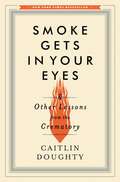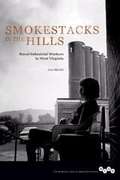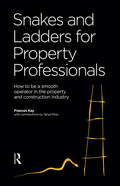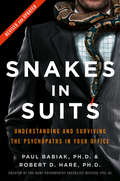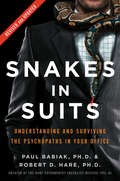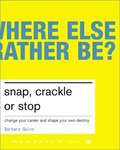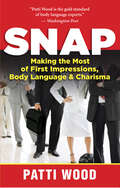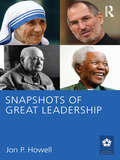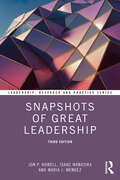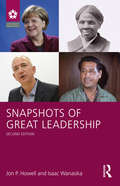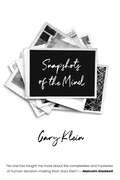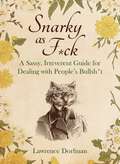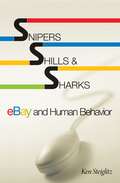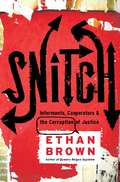- Table View
- List View
Smoke Gets in Your Eyes: And Other Lessons from the Crematory
by Caitlin DoughtyMost people want to avoid thinking about death, but Caitlin Doughty--a twenty-something with a degree in medieval history and a flair for the macabre--took a job at a crematory, turning morbid curiosity into her life's work. Thrown into a profession of gallows humor and vivid characters (both living and very dead), Caitlin learned to navigate the secretive culture of those who care for the deceased. Smoke Gets in Your Eyes tells an unusual coming-of-age story full of bizarre encounters and unforgettable scenes. Caring for dead bodies of every color, shape, and affliction, Caitlin soon becomes an intrepid explorer in the world of the dead. She describes how she swept ashes from the machines (and sometimes onto her clothes) and reveals the strange history of cremation and undertaking, marveling at bizarre and wonderful funeral practices from different cultures. Her eye-opening, candid, and often hilarious story is like going on a journey with your bravest friend to the cemetery at midnight. She demystifies death, leading us behind the black curtain of her unique profession. And she answers questions you didn't know you had: Can you catch a disease from a corpse? How many dead bodies can you fit in a Dodge van? What exactly does a flaming skull look like?Honest and heartfelt, self-deprecating and ironic, Caitlin's engaging style makes this otherwise taboo topic both approachable and engrossing. Now a licensed mortician with an alternative funeral practice, Caitlin argues that our fear of dying warps our culture and society, and she calls for better ways of dealing with death (and our dead).
Smoke and Mirrors: The Politics and Culture of Air Pollution
by E. Melanie DuPuisWho gets to breathe clean air? Who benefits from the cheaper products produced with dirty air? The answers, as the contributors to Smoke and Mirrors tell us, are sometimes as gray as the air itself. From the coal factory chimneys in Manchester in the late nineteenth century to the smog hanging over Los Angeles in the late twentieth century, air pollution has long been one of the greatest threats to our environment. In this important collection of original essays, the leading environmental scientists and social scientists examine the politics of air pollution policies and help us to understand the ways these policies have led to, idiosyncratic, effective, ineffective, and even disastrous choices about what we choose to put into and take out of the air. Offering historical, contemporary and cross-national perspectives, this volume provides a refreshing new approach to understanding how air pollution policies have evolved over time.
Smoker beyond the Sea: The Story of Puerto Rican Tobacco
by Juan José BaldrichIn this groundbreaking volume, Juan José Baldrich traces the deep changes affecting Puerto Rican tobacco growers and manufacturers and their export markets from the Spanish colonization of the island to the present. Based on more than twenty years of research in the United States and Puerto Rico, the book sheds light on the important history of tobacco in Puerto Rico while highlighting the people and practices that have indelibly shaped Puerto Rico and its culture.Smoker beyond the Sea: The Story of Puerto Rican Tobacco is a work of recovery that examines tobacco’s transitions from medicinal use to rolls fit for chewing and pipe smoking, followed by the appropriation of the Cuban paradigm for cigars and cigarettes, and, finally, to the US models after the 1898 invasion. This pioneering volume also offers the only history of the US tobacco monopoly in local agriculture and manufacture from its beginning in 1899 to the bankruptcy of its last successor company forty years later. Baldrich's extensive research documents the organization of the cigar and cigarette manufacturing sectors and the resulting development of trade unions and socialist ideals. This multidisciplinary investigation gives due attention to the modifications that farmers made to tobacco planting and harvesting techniques in fine-tuning plants to the expected aromas and tastes of the manufactured commodities. In addition, Baldrich pays considerable attention to gender relations in the labor process, not only in the manufacturing sector but also in tobacco agriculture. The book also provides the only narrative of the rise and maturity of the Hermanos Cheos, a powerful apocalyptical movement that began and spread in the tobacco growing regions. Ultimately, this encompassing volume fills a major gap in the histories of tobacco-producing islands in the Caribbean.
Smokestacks in the Hills: Rural-Industrial Workers in West Virginia (The Working Class in American History)
by Lou MartinLong considered an urban phenomenon, industrialization also transformed the American countryside. Lou Martin weaves the narrative of how the relocation of steel and pottery factories to Hancock County, West Virginia, created a rural and small-town working class--and what that meant for communities and for labor. As Martin shows, access to land in and around steel and pottery towns allowed residents to preserve rural habits and culture. Workers in these places valued place and local community. Because of their belief in localism, an individualistic ethic of "making do," and company loyalty, they often worked to place limits on union influence. At the same time, this localism allowed workers to adapt to the dictates of industrial capitalism and a continually changing world on their own terms--and retain rural ways to a degree unknown among their urbanized peers. Throughout, Martin ties these themes to illuminating discussions of capital mobility, the ways in which changing work experiences defined gender roles, and the persistent myth that modernizing forces bulldozed docile local cultures. Revealing and incisive, Smokestacks in the Hills reappraises an overlooked stratum of American labor history and contributes to the ongoing dialogue on shifts in national politics in the postwar era.
Smoking Environments in China: Challenges for Tobacco Control (Global Perspectives on Health Geography)
by Ross Barnett Tingzhong Yang Xiaozhao Y. YangThis book fills a major gap in research into smoking and tobacco control in China. In recent decades, few studies have explored the significance of geographical factors and the role they have played either in affecting the prevalence of smoking or in tobacco control responses to the smoking epidemic in China. In light of this, the book investigates the importance of national, regional and local environmental factors affecting smoking in China. It shows how geographical, social and institutional contexts have influenced the implementation and success of tobacco control initiatives, and situates smoking trends in China in a broader global context. The authors synthesize Chinese and western research on the smoking epidemic and uniquely focus on the importance of environmental factors and Chinese cultural perspectives in understanding smoking behaviour and the ineffectiveness of many tobacco control initiatives, especially how these conflict with Chinese economic policy. The book is aimed at academic and policy audiences both internationally and inside China, and will be of interest to a wide audience, not only geographers, but also epidemiologists, sociologists and others working in public health.
Smugglers and States: Negotiating the Maghreb at Its Margins (Columbia Studies in Middle East Politics)
by Max GallienSmuggling is typically thought of as furtive and hidden, taking place under the radar and beyond the reach of the state. But in many cases, governments tacitly permit illicit cross-border commerce, or even devise informal arrangements to regulate it. Drawing on extensive fieldwork in the borderlands of Tunisia and Morocco, Max Gallien explains why states have long tolerated illegal trade across their borders and develops new ways to understand the political economy of smuggling.This book examines the rules and agreements that govern smuggling in North Africa, tracing the involvement of states in these practices and their consequences for borderland communities. Gallien demonstrates that, contrary to common assumptions about the effects of informal economies, smuggling can promote both state and social stability. States not only turn a blind eye to smuggling, they rely on it to secure political acquiescence and maintain order, because it provides income for otherwise neglected border communities. More recently, however, the securitization of borders, wars, political change, and the pandemic have put these arrangements under pressure. Gallien explores the renegotiation of the role of smuggling, showing how stability turns into vulnerability and why some groups have been able to thrive while others have been pushed further to the margins. With both rich empirical detail and novel theoretical contributions, Smugglers and States offers important insights into security and stability in North Africa and the prospects for economic inclusion in a context where many livelihoods exist outside of the law.
Snacks: A Canadian Food History
by Janis Thiessen"Snacks" is a history of Canadian snack foods, of the independent producers and workers who make them, and of the consumers who can’t put them down. Janis Thiessen profiles several iconic Canadian snack food companies, including Old Dutch Potato Chips, Hawkins Cheezies, and chocolate maker Ganong. These companies have developed in distinctive ways, reflecting the unique stories of their founders and their intense connection to specific locations. These stories of salty or sweet confections also reveal a history that is at odds with popular notions of “junk food.” Through extensive oral history and archival research, Thiessen uncovers the roots of our deep loyalties to different snack foods, what it means to be an independent snack food producer, and the often-quirky ways snacks have been created and marketed. Clearly written, extensively illustrated, and lavish with detail about some of Canadians’ favorite snacks, this is a lively and entertaining look at food and labour history.
Snake Oil: How Fracking's False Promise of Plenty Imperils Our Future
by Richard HeinbergThe rapid spread of hydraulic fracturing ("fracking") has temporarily boosted US natural gas and oil production ... and sparked a massive environmental backlash in communities across the country. The fossil fuel industry is trying to sell fracking as the biggest energy development of the century, with slick promises of American energy independence and benefits to local economies. SNAKE OIL casts a critical eye on the oil-industry hype that has hijacked America's energy conversation. This is the first book to look at fracking from both economic and environmental perspectives, informed by the most thorough analysis of shale gas and oil drilling data ever undertaken. Is fracking the miracle cure-all to our energy ills, or a costly distraction from the necessary work of reducing our fossil fuel dependence?
Snakes and Ladders for Property Professionals
by Frances Kaye Tanya RossThis book is for all those seeking to maximise the effectiveness of their professional relationships in order to reach the top of the property or construction industries. It is written to help young professionals at the early stages of their careers increase their understanding of others and to help more experienced practitioners gain additional skills on their way to the top. It guides you through the intricate steps of professional relationship building – internally for positive staff relationships and proactive teams as well as externally for smooth project management, delivery and business development. It contains advice that all ambitious professionals will find helpful: strategies to help you make the most of your strengths and optimise any opportunities that may present themselves. It is generously sprinkled with cases studies, some of which will cover familiar territory, others will act as a useful warning. Anyone choosing a career in the property and construction profession will benefit from reading this book. Whatever your level of seniority, the tips and tactics will help you to spot and avoid those slippery snakes and climb the ladders to the top.
Snakes in Suits
by Robert D. Hare Paul BabiakLet's say you're about to hire somebody for a position in your company. Your corporation wants someone who's fearless, charismatic, and full of new ideas. Candidate X is charming, smart, and has all the right answers to your questions. Problem solved, right? Maybe not. We'd like to think that if we met someone who was completely without conscience -- someone who was capable of doing anything at all if it served his or her purposes -- we would recognize it. In popular culture, the image of the psychopath is of someone like Hannibal Lecter or the BTK Killer. But in reality, many psychopaths just want money, or power, or fame, or simply a nice car. Where do these psychopaths go? Often, it's to the corporate world. Researchers Paul Babiak and Robert Hare have long studied psychopaths. Hare, the author of Without Conscience, is a world-renowned expert on psychopathy, and Babiak is an industrial-organizational psychologist. Recently the two came together to study how psychopaths operate in corporations, and the results were surprising. They found that it's exactly the modern, open, more flexible corporate world, in which high risks can equal high profits, that attracts psychopaths. They may enter as rising stars and corporate saviors, but all too soon they're abusing the trust of colleagues, manipulating supervisors, and leaving the workplace in shambles. Snakes in Suits is a compelling, frightening, and scientifically sound look at exactly how psychopaths work in the corporate environment: what kind of companies attract them, how they negotiate the hiring process, and how they function day by day. You'll learn how they apply their "instinctive" manipulation techniques -- assessing potential targets, controlling influential victims, and abandoning those no longer useful -- to business processes such as hiring, political command and control, and executive succession, all while hiding within the corporate culture. It's a must read for anyone in the business world, because whatever level you're at, you'll learn the subtle warning signs of psychopathic behavior and be able to protect yourself and your company -- before it's too late.
Snakes in Suits, Revised Edition: Understanding and Surviving the Psychopaths in Your Office
by Dr. Paul Babiak Dr. Robert D. HareRevised and updated with the latest scientific research and updated case studies, the business classic that offers a revealing look at psychopaths in the workplace—how to spot their destructive behavior and stop them from creating chaos in the modern corporate organization.Over the past decade, Snakes in Suits has become the definitive book on how to discover and defend yourself against psychopaths in the office. Now, Dr. Paul Babiak and Dr. Robert D. Hare return with a revised and updated edition of their essential guide.All of us at some point have—or will—come into contact with psychopathic individuals. The danger they present may not be readily apparent because of their ability to charm, deceive, and manipulate. Although not necessarily criminal, their self-serving nature frequently is destructive to the organizations that employ them. So how can we protect ourselves and our organizations in a business climate that offers the perfect conditions for psychopaths to thrive?In Snakes in Suits, Hare, an expert on the scientific study of psychopathy, and Babiak, an industrial and organizational psychologist and a leading authority on the corporate psychopath, examine the role of psychopaths in modern corporations and provide the tools employers can use to avoid and deal with them. Together, they have developed the B-Scan 360, a research tool designed specifically for business professionals.Dr. Babiak and Dr. Hare reveal the secret lives of psychopaths, explain the ways in which they manipulate and deceive, and help you to see through their games. The rapid pace of today’s corporate environment provides the perfect breeding ground for these "snakes in suits" and this newly revised and updated classic gives you the insight, information, and power to protect yourself and your company before it’s too late.
Snap Inc. Goes Public (A)
by Lynn Sharp Paine Will HurwitzSnap Inc.'s chairman must decide how to address investor concerns about the company's unprecedented plans to issue only non-voting shares in its upcoming IPO. The case is set in early 2017 following the public availability of Snap's IPO filing with the U.S. Securities and Exchange Commission (SEC). It describes the company's meteoric rise from its conception by its young founders in 2011 to its multi-billion dollar valuation. When Snap filed for its long-anticipated IPO that could value it at more than $20 billion, it described its plans to go public with three share classes providing public investors shares with no votes on matters customarily put to a shareholder vote and allowing its two co-founders control over such matters. The case details the checkered history of multiple share class structures, highlights arguments for and against them, and explores the potential implications for index funds. Investors managing over $3 trillion sent a letter to Snap Chairman Michael Lynton and Co-Founders Evan Spiegel and Robert Murphy asking them to reconsider the share structure just one day after the company's S-1 was made public. As controversy mounted and with the IPO possibly just a month away, Lynton must decide how to respond to the investors' letter.
Snap Inc. Goes Public (B)
by Lynn Sharp Paine Will HurwitzSnap Inc.'s chairman must decide how to address investor concerns about the company's unprecedented plans to issue only non-voting shares in its upcoming IPO. The case is set in early 2017 following the public availability of Snap's IPO filing with the U.S. Securities and Exchange Commission (SEC). It describes the company's meteoric rise from its conception by its young founders in 2011 to its multi-billion dollar valuation. When Snap filed for its long-anticipated IPO that could value it at more than $20 billion, it described its plans to go public with three share classes providing public investors shares with no votes on matters customarily put to a shareholder vote and allowing its two co-founders control over such matters. The case details the checkered history of multiple share class structures, highlights arguments for and against them, and explores the potential implications for index funds. Investors managing over $3 trillion sent a letter to Snap Chairman Michael Lynton and Co-Founders Evan Spiegel and Robert Murphy asking them to reconsider the share structure just one day after the company's S-1 was made public. As controversy mounted and with the IPO possibly just a month away, Lynton must decide how to respond to the investors' letter.
Snap, Crackle, or Stop: Change Your Career and Create Your Own Destiny
by Barbara QuinnWhether you've snapped or are crackling with discontent, this book will help you evaluate your current career state and guide you to make the necessary career change. Filled with examples of real people who have transformed their lives, <i>Snap, Crackle, or Stop</i> will inspire you to do the same. Momentum books are for people who want to make things happen in their career and their life, who want to work at something they enjoy and that's worthy of their talent and their time. Momentum people have values and principles. They question who they are and what they do. Wherever they work, they want to feel that what they do has meaning.
Snap: Making the Most of First Impressions, Body Language, and Charisma
by Patti WoodFrom business meetings to social events to first dates to job interviews, we all encounter new people every day. Our ability to read body cues and convey the right first impression drives the success and quality of our personal and professional lives. Body language expert Patti Wood, a sought-after consultant and speaker to Fortune 500 companies, helps businesses and individuals stand out, create profitable relationships, and thrive in competitive circumstances. Now she brings that knowledge to our daily lives, offering practical and proven guidance on accurately interpreting body cues and creating impressions both in person and digitally. In Snap, you’ll learn how to: * Use your voice and body language to convey confidence and charisma, authenticity and authority * Immediately discern people’s hidden agendas * Make the best impressions via email, phone, video conferencing, and social networks * Convey and interpret signals of likability, power, credibility, and attractiveness * Use nonverbal tools to spot true integrity or recognize charming frauds * Attract the best matches in business and romantic partners * Recognize how you really look to others
Snapp: Scaling under Sanctions in Iran (A)
by Gamze Yucaoglu Meg RithmireThe case opens in November 2019 as Eyad Alkassar and Mahmoud Fouz, co-founders of Iran's first and leading ride-hailing platform, Snapp, find out about Apple's and Google's decision to remove all Iranian apps from their respective application stores. The case takes us through the founding story of Snapp in 2014 to how the company grew to reach two million daily rides in Iran servicing 30 million customers through its two million registered drivers in 100 cities in Iran. The case then goes into detail about how the removal of all Iran-based apps from application stores limited Snapp's operations and its go-to-market channels. Next, the case chronicles how the co-founders focused on finding operational and technological solutions to minimize Snapp's reliance on U.S. technology following the U.S.' withdrawal from the Joint Comprehensive Plan of Action (JCPOA) in May 2018 and instating the secondary sanctions on Iran. The case highlights the challenges of operating under sanctions and the different ways the co-founders try to find to keep Snapp alive in a market that had been out of reach for Western investors. In 2019, Snapp had become the largest Internet company in the Middle East yet it was increasingly difficult to navigate the operational hurdles. The co-founders could not help but think whether it was now time to reach out to major media outlets and launch a public relations campaign to create awareness around the unexpected decision that had put the very existence of many companies at risk, including Snapp's. Alkassar and Fouz needed to weigh it against Snapp's realities. The case then asks: Should they go public with their story, or would it be better to stay under the radar and focus on efficiency and sustainability of operations?
Snapp: Scaling under Sanctions in Iran (B)
by Gamze Yucaoglu Meg RithmireThe case opens in November 2020 as Eyad Alkassar and Mahmoud Fouz, co-founders of Iran's first and leading ride-hailing platform, Snapp, eagerly await the results of the U.S. presidential elections. The case takes us through the challenging times between November 2019 and November 2020, as the confounders navigated Snapp through an increasingly challenging environment of sanctions, stricter restrictions of big tech companies, and since February 2020, through the operational difficulties exacerbated by the COVID-19 pandemic that shook Iran to its core. The case highlights the challenges of operating under sanctions and the different ways the co-founders try to find to keep Snapp alive and asks how the U.S. election results could change the environment in which Snapp operates, as the two presidential candidates have vastly different approaches to their policy to Iran.
Snapple
by John DeightonTells the story of Snapple's rise and fall, and poses the question "Can it recover?" Many soft-drink brands flourished in the 1980s serving New York's Yuppies, but only Snapple made the big time. It went from local to national success and was poised to go international when the founders sold out to Quaker. The brand proved harder to manage than Quaker anticipated and in 1997 was sold for a fraction of its acquisition price. The case presents factors accounting for the growth and decline and provides a qualitative study of the brand. What action should the new owners take?
Snapshots of Great Leadership
by Jon P. HowellThis is a great book describing leaders (both good and bad) who either have accomplished amazing feats or who brought destruction or death to scores of people. Although the goals of these individuals were often quite different, the leadership processes they used were frequently similar. The book also includes an introductory chapter explaining the latest theories of leadership. Each snapshot will add an important “reality check” to the theories and models described in most introductory leadership textbooks, making this an important supplement for students taking leadership courses. Leaders from various disciplines, historical, religious, political, sports, and business, are included, as well as leaders from around the world. Each chapter ends with a discussion of theories of leadership pertaining to that leader, and questions for discussion.
Snapshots of Great Leadership (Leadership: Research and Practice)
by Jon P. Howell Isaac Wanasika Maria J. MendezSnapshots of Great Leadership offers a thorough look into leaders who have either accomplished amazing feats or brought destruction. Now in its third edition, this key volume explores what it means to be a great leader, and clearly explains the lives, triumphs, and challenges of a range of diverse leaders across history and into the modern day.Packed into easily digestible chapters, the authors demonstrate how, although the goals of these individuals were often quite different, the leadership processes they used were frequently similar. The opening chapter explains the latest theories of leadership and this new edition features one new leadership theory, Authentic Leadership, as well as recent research findings on the most popular theories. The authors have replaced nine leaders from earlier editions with new leaders including Elon Musk, Maria Montessori, and Virginia Hall. These new leaders exemplify unique leadership attributes and outstanding leadership effectiveness. Each leader snapshot adds an important "reality check" to the theories and models described in most introductory leadership textbooks, making this a key text for students taking leadership courses.Scholars and students of leadership and management will benefit from this accessible and comprehensive volume, as will leadership practitioners looking to reflect on and develop their own leadership skills. Offering valuable insights into the lives of historical and corporate leaders, the book is a compelling read for casual readers as well.
Snapshots of Great Leadership (Leadership: Research and Practice)
by Jon P. Howell Wanasika IsaacSnapshots of Great Leadership describes leaders who have either accomplished amazing feats or brought destruction. Although the goals of these individuals were often quite different, the leadership processes they used were frequently similar. The opening chapter explains the latest theories of leadership. Each leader snapshot adds an important "reality check" to the theories and models described in most introductory leadership textbooks, making this a key text for students taking leadership courses. This new edition features additional women and international leaders, a new "You Decide" section, and a Conclusion that clarifies the differences between good and bad leaders.
Snapshots of the Mind
by Gary KleinHow people make decisions, size up situations, spot anomalies, and anticipate problems in real-world settings.Gary Klein, author of the bestselling Sources of Power, is the cognitive psychologist who discovered how people actually make decisions, particularly under time pressure and uncertainty. In Snapshots of the Mind, he offers a set of short essays—&“snapshots&” of different aspects of cognitive functioning in real-world settings that will help us learn to recognize the cognitive processes that underlie and drive performance. In these essays Klein provides practical tools for escaping fixation on initial hunches and learning to detect the ways that people make decisions, size up situations, spot anomalies, and anticipate problems. Snapshots of the Mind grows out of the Naturalistic Decision Making movement, which studies how decision makers handle uncertainty and complexity in high-stakes situations. In the essays, Klein examines how people make tough choices and assessments in the real-world, discussing such topics as training, information technology, teamwork, expertise, and insights. Debunking the idea that artificial intelligence will soon take over human decision making, he argues instead for machines that make us smarter and expand our expertise. He describes his Recognition-Primed Decision (RPD) model, which has been incorporated into Army doctrine and was one of the inspirations for Malcolm Gladwell&’s Blink. Snapshots of the Mind offers fresh takes on such topics as confirmation bias, anomaly detection, intuition, anticipatory thinking and perspective-taking. Readers come away attuned to the primary aspects of expert cognition: the mindsets, mental models, and perceptual sensitivity.
Snarky As F*ck: A Sassy, Irreverant Guide for Dealing with People's Bullsh*t
by Lawrence DorfmanLearn how to become the most glorious a**shole the world has ever seen. Are you tired of everyone&’s bullsh*t? Responding to their dumba** questions? Making boring small talk and offering robotic replies? Can&’t take one more monotonous, people-pleasing conversation with a distant family member or a friend&’s friend? If you have no f*cks left to give and want to dish out some serious snark, grab a copy Snarky as F*ck, the premiere guide to all things sarcastic and sardonic. Explore topics such as: Sex and Romance (Responses to D*ck Pics, Mansplaining, and More) Geography (Snarkiest States in the US!) 21st Century Snark (Curse Word Definitions, Inspirational Bullsh*t, etc.) In the Workplace (Snarky Replies, Sotto Voce Things to Say to Your Boss) Family, Friends, and other Influencers (Greeting Cards for Bastards, and Insults for Around the Dinner Table!) Movies, Television, and Music (&“I&’m clapping because it&’s finished, not because I like it.&”) Politics and Government (Presidential Insults and Your New Favorite Game: Match the Scandal!) In the News (Florida Man, Karen and Brad, Idiots on Wheels, et al) Hear wit, sarcasm, and offhanded comments from masters like Dorothy Parker, Groucho Marx, H. L. Mencken, Oscar Wilde, Robert Benchley, George Bernard Shaw, Jules Feiffer, Bill Hicks, Bill Maher, Phyllis Diller, Édith Piaf, W. C. Fields, Mark Twain, Voltaire, Charles Bukowski, to name a few. This lofty tome promises to fulfill the need to chuckle, guffaw, titter, groan, and belly laugh as readers dip in and out of the great minds in literature, comedy, movies, music, and more. Proceed with caution, but know you&’ll come out the other side one snarky motherf*cker, ready to take on the world, one idiot at a time.
Snipers, Shills, and Sharks: eBay and Human Behavior
by Ken SteiglitzEvery day on eBay, millions of people buy and sell a vast array of goods, from rare collectibles and antiques to used cars and celebrity memorabilia. The internet auction site is remarkably easy to use, which accounts in part for its huge popularity. But how does eBay really work, and how does it compare to other kinds of auctions? These are questions that led Ken Steiglitz--computer scientist, collector of ancient coins, and a regular eBay user--to examine the site through the revealing lens of auction theory. The result is this book, in which Steiglitz shows us how human behaviors in open markets like eBay can be substantially more complex than those predicted by standard economic theory. In these pages we meet the sniper who outbids you in an auction's closing seconds, the early bidder who treats eBay as if it were an old-fashioned outcry auction, the shill who bids in league with the seller to artificially inflate the price--and other characters as well. Steiglitz guides readers through the fascinating history of auctions, how they functioned in the past and how they work today in online venues like eBay. Drawing on cutting-edge economics as well as his own stories from eBay, he reveals practical auction strategies and introduces readers to the fundamentals of auction theory and the mathematics behind eBay. Complete with exercises and a detailed appendix, this book is a must for sophisticated users of online auctions, and essential reading for students seeking an accessible introduction to the study of auction theory.
Snitch: Informants, Cooperators & the Corruption of Justice
by Ethan BrownOur criminal justice system favors defendants who know how to play the "5K game": criminals who are so savvy about the cooperation process that they repeatedly commit serious crimes knowing they can be sent back to the streets if they simply cooperate with prosecutors. In Snitch, investigative reporter Ethan Brown shows through a compelling series of case profiles how the sentencing guidelines for drug-related offenses, along with the 5K1. 1 section, have unintentionally created a "cottage industry of cooperators," and led to fabricated evidence. The result is wrongful convictions and appallingly gruesome crimes, including the grisly murder of the Harvey family in Richmond, Virginia and the well-publicized murder of Imette St. Guillen in New York City. This cooperator-coddling criminal justice system has ignited the infamous "Stop Snitching" movement in urban neighborhoods, deplored by everyone from the NAACP to the mayor of Boston for encouraging witness intimidation. But as Snitch shows, the movement is actually a cry against the harsh sentencing guidelines for drug-related crimes, and a call for hustlers to return to "old school" street values, like: do the crime, do the time. Combining deep knowledge of the criminal justice system with frontline true crime reporting, Snitch is a shocking and brutally troubling report about the state of American justice when it's no longer clear who are the good guys and who are the bad.
